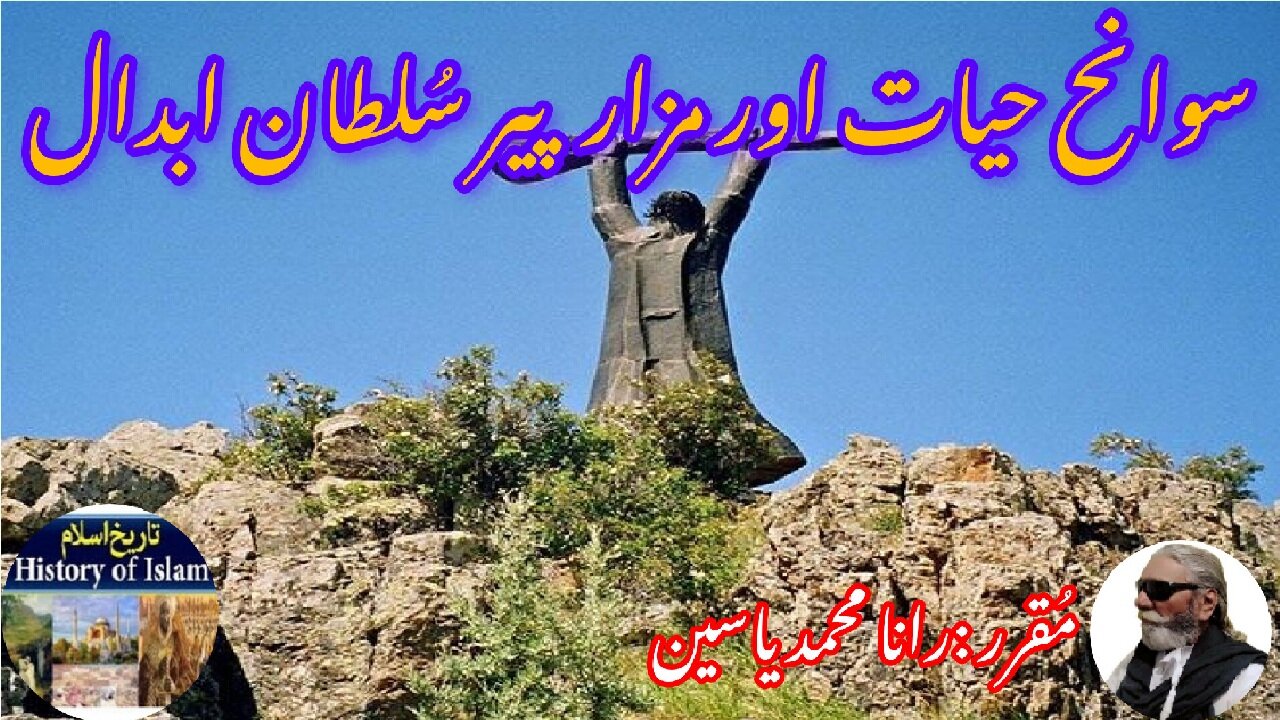Premium Only Content

Pir Sultan Abdal and his shrine पीर सुल्तान अब्दाल پیر سلطان ابدال کی سوانح حیات اور مزار کی تاریخ
@islamichistory813 #pirsultanabdal #sufisaint #culturalheritage #biography #islamicmysticism #islamicphilosophy #shrine #historicalfigures
Biography of Pir Sultan Abdal and the history of his shrine
Dekhti Aankhooon aur sountay kaanoon ko Asslamoalaikum, sisters, brothers friends and elders, in informative series videos of Islamic ascolars, sufisaints, cultural heritages, islamic philosophys, islamic mysticisms and historical figures. today we are describing biography of Pir Sultan Abdal and the history of his shrine.
Pir Sultan Abdal, born Haydar, is a legendary and influential religious figure in the Alevism tradition, a sect of Islam with roots deeply embedded in Turkish and broader Anatolian spirituality. His life and teachings are of immense significance to his followers, and while details about his life are often drawn from folkloric sources, religious poems, and oral traditions, he is widely regarded as a symbol of resistance, spiritual enlightenment, and devotion. Pir Sultan Abdal’s birthplace is thought to be the village of Banaz in the present-day Sivas Province of Turkey, a region known for its rich history and cultural diversity. He was born in the 16th century, during a period when the Ottoman Empire was embroiled in the religious and political turmoil of the Ottoman–Persian Wars, a time when religious orthodoxy, especially Sunni Islam, was being strongly enforced across the empire. His life and his execution, often recounted in oral history and religious songs, have left a lasting imprint on Alevi and Turkish cultural identity.
Pir Sultan Abdal’s significance primarily lies in his unwavering commitment to the Alevi faith and his critique of the dominant orthodox Sunni religious establishment of the time. The Alevis, a heterodox Muslim group, follow an interpretation of Islam that emphasizes the mystical teachings of Sufism and a deep veneration for figures such as Ali ibn Abi Talib, the cousin and son-in-law of Prophet Muhammad (PBUH). Unlike mainstream Sunni Islam, Alevis have historically focused on the inner spiritual dimensions of faith, embracing equality, social justice, and a sense of unity with nature. Pir Sultan Abdal was a staunch advocate for these ideals, emphasizing the importance of love, tolerance, and respect for all human beings, regardless of their religious or social status. His message resonated deeply with the marginalized groups in Ottoman society, including those who were disillusioned with the political and religious status quo.
During the time of the Ottoman–Persian Wars, Pir Sultan Abdal's views on religious heterodoxy and his political inclinations led to his open opposition to the established power structures of the empire. He was part of a broader movement of religious and political dissent, advocating for the subversion of a rigidly orthodox religious system and calling for a more egalitarian and spiritually inclusive society. In particular, Pir Sultan Abdal’s stance against the Ottoman Sultan's policies, which enforced strict Sunni orthodoxy, placed him at odds with the imperial authorities. His spiritual and political activism aligned with the broader struggles of the Turkmen and Alevi communities, who often found themselves oppressed by the centralizing forces of the empire. Pir Sultan Abdal became a symbol of resistance, not only for his religious beliefs but also for his advocacy of political subversion and his challenge to the monolithic authority of the Sultan.
The culmination of Pir Sultan Abdal's life was his execution, an event that further cemented his legacy as a martyr and a hero for his followers. His defiance of the Ottoman authorities led to his arrest, and he was eventually executed by hanging in the city of Sivas. His death, however, did not mark the end of his influence; rather, it solidified his status as a legendary figure among the Alevis and the wider Turkish population. His martyrdom is a central theme in Alevi religious poetry and song, and many of his religious poems, which he is believed to have composed himself, continue to be sung by ashiks (Turkish folk poets and minstrels) during religious ceremonies and communal gatherings. These poems reflect his deeply spiritual philosophy, focusing on themes of divine love, unity, and the rejection of oppression and injustice.
Pir Sultan Abdal’s life and teachings have had a lasting impact on Turkish folklore, Sufism, and the Alevi community, and his shrine in the city of Sivas serves as a pilgrimage site for his followers. The shrine, a symbol of his enduring spiritual legacy, attracts visitors who seek to pay homage to a man whose life was devoted to the principles of love, equality, and resistance against tyranny. The shrine’s location, near the site of his execution, adds to its symbolic importance as a place of spiritual reflection and connection to the history of Alevi resistance. Pilgrims visit the shrine to commemorate Pir Sultan Abdal's life and to renew their commitment to the values he espoused. It is not only a place for religious devotion but also a reminder of the political and social struggles that Pir Sultan Abdal endured, which resonate deeply with the Alevi community’s ongoing fight for religious freedom and recognition within Turkish society.
Throughout history, the teachings of Pir Sultan Abdal have been passed down through generations, particularly through his religious poems, which are considered a cornerstone of Alevi spirituality. These poems are filled with metaphysical reflections on the nature of the divine, the importance of self-purification, and the need for spiritual unity. The Ashiks, who are the bearers of this oral tradition, continue to preserve and share Pir Sultan Abdal's message, ensuring that his influence endures through time. His life and his poetry continue to inspire those who seek justice, equality, and a deeper spiritual connection to God.
In conclusion, Pir Sultan Abdal stands as a central figure in the Alevi tradition, embodying the ideals of resistance, spiritual enlightenment, and social justice. His commitment to religious heterodoxy and his political subversion in the face of Ottoman orthodoxy have made him a martyr for the Alevi people, and his legacy is celebrated through his religious poetry and the pilgrimage to his shrine. Pir Sultan Abdal’s life serves as a reminder of the power of faith, love, and resistance in the face of oppression, and his teachings continue to inspire generations of followers who seek a more just and spiritually fulfilling world.
With this, we seek your permission until tomorrow, tomorrow we will describe the biography of Shaykh Malik and the history of his Shrine.
========================
-
 9:51
9:51
ISLAMIC HISTORY
8 hours agoIslamic History Episode 242 The Exodus of the Alawites अलावियों का पलायन علویوں کا خروج
9 -
 1:06:26
1:06:26
vivafrei
3 hours agoLive with Alexa Lavoie! ANTIFA in Canadian Government? RCMP the New Gestapo? AND MORE!
128K38 -
 40:38
40:38
Dad Saves America
23 hours agoLeft Is Right, Up Is Down: The Overton Window Has Been Shattered
5.52K1 -
 LIVE
LIVE
LFA TV
18 hours agoBREAKING NEWS ALL DAY! | TUESDAY 9/30/25
1,064 watching -
 LIVE
LIVE
freecastle
6 hours agoTAKE UP YOUR CROSS- May the forces of evil become confused on the way to your house.
233 watching -
 1:23:05
1:23:05
Awaken With JP
5 hours agoGetting NUTS! FBI Did J6, Comey Indicted, and More! - LIES ep 110
55K27 -
 2:09:51
2:09:51
Pop Culture Crisis
3 hours agoJK Rowling OBLITERATES Emma Watson, Trump Vs Ariana Grande, Could The Rock be President? | Ep. 926
40.2K9 -
 1:46:23
1:46:23
The HotSeat
2 hours agoCommander In Chief and SECWAR Address The Troops, and I AM HERE FOR IT!
19.7K15 -
![[Ep 759] Resist Digital ID | Dems to Shut Down Gov | Obama Library Funds Tides / Terrorists](https://1a-1791.com/video/fwe2/55/s8/1/8/U/L/m/8ULmz.0kob-small-Ep-759-Resist-Digital-ID-De.jpg) LIVE
LIVE
The Nunn Report - w/ Dan Nunn
3 hours ago[Ep 759] Resist Digital ID | Dems to Shut Down Gov | Obama Library Funds Tides / Terrorists
168 watching -
 1:42:33
1:42:33
The Quartering
6 hours agoFat Soldiers BLASTED, Kirk Assassin In Court, JK Rowling Destroys Emma Watson & Crowder Takes Risk
132K27